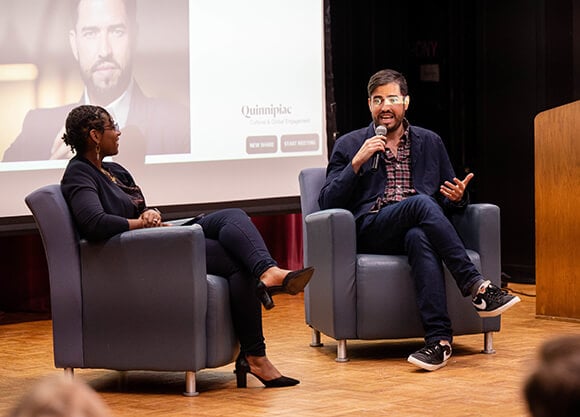
Emmy-winning documentarian marks Latinx Heritage Month with ‘a miracle’
September 29, 2022

September 29, 2022

Such were the circumstances behind Oscar Guerra’s Emmy-winning PBS Frontline feature, “Love, Life & the Virus,” which was screened for students on Tuesday in the Buckman Theater as part of Quinnipiac University’s ongoing celebration of Latinx Heritage Month.
Guerra, a tenacious documentarian and researcher who’s also an associate professor of film and video at the University of Connecticut’s Stamford branch, had just started collaborating with Pulitzer Prize-winning photojournalist John Moore when they encountered a family of Guatemalan immigrants thrust into an unimaginable scenario by the COVID-19 pandemic in March 2020.
Forty-two hours of footage compiled over five weeks between the hospital and the family’s home in Stamford, followed by a rigorous editing process, resulted in 34 emotionally gripping minutes.
“I didn’t have a project in mind,” said Guerra, who gave some opening remarks before showing his film and engaging in a Q&A with the audience. “It was through a friend of a friend that we learned about Zully [the mother of the Guatemalan family featured]. I thought I might start telling [John’s] story, but as soon as we learned about Zully, we realized, ‘This is big. It’s really a miracle.’ You saw how an entire community started rallying around the family.”
After an introduction by Emily Diaz ’24, president of the Latino Cultural Society and treasurer of the Indigenous Student Union, Guerra was interviewed on stage by Veronica Jacobs, associate director for multicultural education at Quinnipiac.
A native of Mexico who emigrated to the U.S. 11 years ago, Guerra reflected on his original dream of being a mariachi singer before becoming a self-professed “camera nerd.” He discovered a passion for telling stories that unite audiences, tear down dehumanizing narratives and foster empathy for marginalized communities.
“I started realizing the power of media, the power of being able to construct a product that can spark conversations,” Guerra said. “Filmmaking has that power.”
Those themes all culminated in a passion project, “Love, Life & the Virus,” the short film that earned him a News & Documentary Emmy Award in 2021 for best story in a newsmagazine. The piece, which was also nominated in the outstanding feature story in a newsmagazine category, recounts the sudden and seismic fracture of a working-class family whose matriarch, Zully, contracted COVID-19 while pregnant and slipped into a coma after giving birth to a baby boy, Neysel, five weeks before her due date.
Emerging from a harrowing, three-week stretch in the ICU during which her breathing was aided by a ventilator, Zully was weak and disoriented. Meanwhile, Zully’s son, Junior, and husband, Marvin, were also stricken with the virus, along with her mother. Thankfully, Junior’s elementary school teacher volunteered to care for Neysel for the intervening five weeks before a tearful reunion with Zully, Marvin and Junior.
Filmed during those uncertain months when facts about COVID’s potency were still being gathered and emergency rooms were overwhelmed with ailing patients, Guerra’s piece deftly weaves those challenges with the ones inherent to the immigrant experience in America.
Amid the Q&A portion of the event, Guerra was asked a pointed question about whether he faced any difficulty maintaining journalistic standards while documenting such an undeniably affecting tale. His answer served as apt advice for any young filmmaker looking to make a difference.
“We’re humans,” said Guerra, who holds a PhD in mass communication from the University of North Carolina, where he first met Chris Roush, dean of the School of Communications at Quinnipiac.
“You have to develop a sense of when to talk, when to be quiet. Moments of silence are important. ... The best thing you can do is have open communication with your subjects,” Guerra said. “You’re there because you’re trying to tell a story. You’re trying to capture a story in all its glory and complexities. But remind yourself that you’re also human.”
The Department of Cultural and Global Engagement’s observance of Latinx Heritage Month began Sept. 15 and will run through Oct. 15. It honors the cultural contributions of more than 20 Latin American countries. The department will host an inclusive conversation on Oct. 14 in the Carl Hansen Student Center.
Quinnipiac Today is your source for what's happening throughout #BobcatNation. Sign up for our weekly email newsletter to be among the first to know about news, events and members of our Bobcat family who are making a positive difference in our world.
Sign Up Now